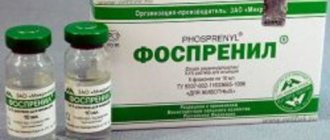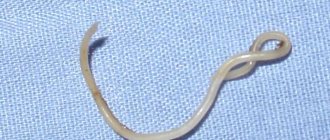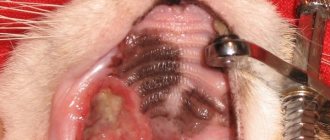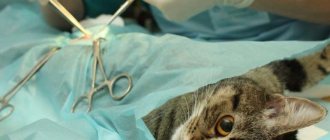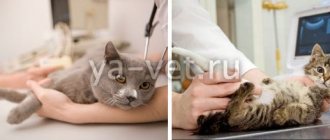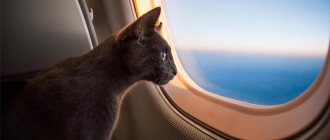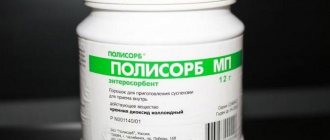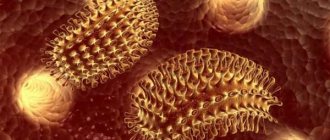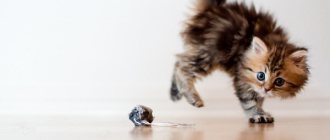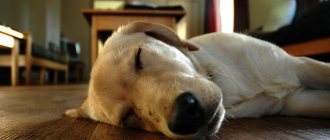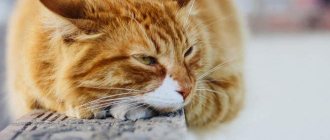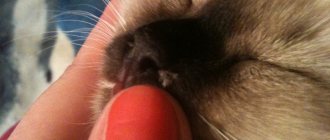When there is no reason to worry
In some cases, a cat does not eat anything for understandable, objective reasons, for example,
a change of season - if a cat is allowed outside, in the spring it may eat less, as the body adjusts to the summer season: besides, the animal often finds other food on the street; poor appetite is observed during the breeding season, which also occurs in spring: the cat may become more aggressive, overexcited and lose significant weight; strong changes in weather, pressure changes can also cause a loss of appetite: especially if the cat is already quite old; finally, if the owner washed the bowl with a chemical and inadvertently did not completely wash off the residue, this also explains why the cat lacks appetite.
Thus, you should only worry in cases where other symptoms are added to the loss of appetite - for example, nausea, vomiting, lethargy for a long period of time. It is possible that the cat has developed a stomach or intestinal disorder, so an urgent consultation with a veterinarian will be needed.
Lack of appetite in a cat is always associated with the presence of some disease. Ignoring this phenomenon can lead to progression of the disease for your pet.
We return the cat's appetite
Pay attention to how much your cat doesn't eat. If there is no appetite for less than a day, there is no need to sound the alarm: perhaps by the evening the pet will come to its senses. However, be careful with small kittens: such a period of fasting is deadly for them.
Check to see if your cat has a fever: loss of appetite often accompanies it. If the cat is not sick, but just being mischievous, try these techniques:
- Check to see if the cat's food has spoiled and if it smells good. Animals smell better;
- Wash bowls thoroughly to remove foreign odors;
- Change the contents of the bowl - the food may have become stagnant;
- Check to see if your cat has been eating in secret. Perhaps he was fed by other family members;
- Offer your cat a treat. Maybe the bad guy just wants something tasty.
Drug treatment of anorexia
The veterinarian always has a “last resort” option - feeding the animal using a tube. Extreme because additional stress and hospitalization do not contribute to recovery. If the pet’s condition allows it to wait, drugs that “awaken” or increase appetite are used as treatment:
Apilak is a drug made from royal jelly of bees. Considered safe, indicated for people, including infants and nursing mothers. Contraindicated in cases of adrenal gland dysfunction and allergies to bee products.
Pernexin - contains B vitamins and substances that activate the liver. Considered safe and natural, prevents anemia.
Peritol is a drug containing substances that stimulate the production of serotonin and histamine, hormones responsible for the feeling of hunger.
Anabolic steroids and Insulin are guaranteed to increase appetite, but should not be used without prior examination.
Valium - in the form of tablets or injections, instantly awakens the appetite. Long-term treatment is not recommended.
Features of feeding kittens and cats
Unfortunately, both small kittens and nursing cats can become poisoned.
What should a kitten be fed if it is poisoned?
General principles are followed, but with minor adjustments for age:
- Kittens under 10 months of age are prescribed a 12-hour fast.
- Give water little by little, so as not to cause vomiting, 10-15 drops, up to 1 ml at a time.
- The frequency of feeding a kitten depends on its age. Healthy babies switch to regular meals twice a day at the age of 4 - 6 months. In case of poisoning, it is recommended to give the kitten food every 4 hours.
Diet for a nursing cat
During lactation, a cat requires 2–3 times more energy. If a nursing cat is poisoned, you can feed the following foods:
- milk, preferably goat's;
- cottage cheese;
- rice and oatmeal porridge;
- boiled lean meat;
- red fish.
It is recommended to wean kittens if they are already well fed. Due to illness, a cat may lose milk - you need to be prepared to feed the kittens artificially.
Feed a nursing cat frequently, every two hours. After a few days, the number of feedings can be reduced and correlated with the suckling of the kittens.
Watching the animal
In itself, reducing the amount of food consumed is not critical. But if, along with a lack of appetite, you notice other changes, for example, in behavior, then most likely the reason lies in your pet’s illness. There can be a lot of reasons for this. Sometimes this condition is caused by a mild cold or the presence of parasites. In this case, it is very easy to correct the situation at home, without even resorting to the help of a veterinarian.
It’s another matter if the cat begins to eat less due to developing respiratory diseases, digestive tract problems and diarrhea. These are all quite serious problems that require the intervention of a veterinarian. Do not forget that the clinical picture may be blurry, so it is best to be examined by a doctor and take the necessary tests. Perhaps the cause is gastrointestinal disease or dental disease. Suffering from pain, the animal refuses to eat, so treatment should begin only after diagnosis.
Disease
If your cat has lost its appetite, the reason may lie in some disease. Problems with eating food may arise due to the following pathologies:
- diabetes;
- pancreatitis;
- infectious diseases;
- helminthic infestations;
- leukemia;
- problems with teeth or oral cavity (stomatitis, gingivitis, etc.);
- renal failure;
- food poisoning;
- intestinal diseases.
If your pet is sick, he will usually have other symptoms:
- vomit;
- nausea;
- lethargy and low activity;
- change in color of mucous membranes;
- rapid breathing, etc.
If your cat has no appetite, is lethargic, or you notice any changes in behavior, contact your veterinarian immediately. He will order an examination, and after establishing a diagnosis, he will prescribe treatment and select the right diet. Do not self-medicate, since it is impossible to determine pathology by lack of appetite. A timely visit to the doctor can be a salvation for the animal. If you have not noticed any significant changes, but your cat categorically refuses to eat, as a result of which she has begun to lose a lot of weight, do not delay going to the veterinary clinic.
Important! In some cases, refusal to eat is caused by prolonged use of medications, as the animal becomes intoxicated. In this case, you need to remove toxins from the body and adjust the basic treatment.
Intestinal obstruction
The cause of the pathology is most often the penetration of foreign objects into the gastrointestinal tract. These can be small toys, threads, pins, Christmas tree rain and other objects that the cat plays with. Intestinal obstruction can also be caused by hair. This pathology poses a danger to the pet's life. If the intestine is completely blocked, surgery may be required. Other symptoms usually indicate a problem:
- bloating;
- lethargy and inactivity;
- lack of stool;
- abdominal pain;
- increasing vomiting.
Some owners give the animal Vaseline oil so that the stuck object comes out on its own, but this is strictly prohibited. When moving, it injures the intestines. An examination and consultation with a doctor is required.
Treatment methods
When a cat suddenly begins to eat a lot, it may be expecting a replenishment. Her body requires more food for the babies growing inside. Before treatment, you should make sure that the individual is not carrying kittens. In case of severe illnesses, the doctor prescribes a course of necessary medications, IVs, and injections. If there are infestations, then it is necessary to eliminate the unwanted inhabitants with the help of medications. In the absence of the opportunity to purchase special cat medications, you can use the human drug - Pirantel. As cats get older, their appetite may either increase or decrease. To maintain the health of your pet, it is recommended to undergo regular examination of the animal at the veterinary clinic. If necessary, urgently take measures to treat your beloved four-legged friend.
A pet’s reluctance to eat can be associated with pathological and physiological factors. Appetite stimulants for cats are selected by a veterinarian depending on the reasons that provoked the problem. A kitten's lack of desire to eat food may be due to an inappropriate bowl or the pet does not like the food itself. Also, the cause of poor appetite often lies in the influence of stress. Such factors can be easily eliminated and the pet will start eating again. But if the disorder is due to illness, then the cat will additionally experience vomiting, lethargy, fever, and other unpleasant symptoms that cannot be eliminated without the help of a specialist.
Drugs To Improve Cat Appetite
Cats are by nature quite picky animals that show the highest mannerism in matters regarding food, especially when the cat is well aware that its owner is simply crazy about it. However, a cat's lack of normal appetite, which inevitably causes rapid weight loss, may indicate health problems.
The cause may be minor stomach upset, rotting teeth, kidney disease and digestive problems. The cat should be taken to a veterinarian immediately for examination. Who knows, maybe she contracted a serious infection or parasite. It’s quite common for cats to proudly turn their nose up at standing food offered to it for a day or two in a row. But when your pet doesn’t eat for several days or a whole week in a row, a visit to the veterinarian becomes more necessary and urgent. After conducting an examination, the veterinarian will make the necessary diagnosis that matches the description of the problem, which, for the most part, may turn out to be quite easily treatable. But how can you tell your cat to eat again? Here, appetite stimulants for cats will definitely help.
For four-legged cats, this is one of the best appetite stimulants in cats. Break up a vitamin B capsule and add it to your cat's regular food. The cat will certainly be attracted by the special smell. Vitamin B activates the sense of smell, which is closely related to the appetite of cats. You can expect your cat to eat directly from the cup.
A natural appetite stimulant for cats, the perennial catnip plant is a beneficial species that makes cats hungry for food. Add a small amount of catnip to the food container to stimulate pheromone receptors in cats. The extract of this plant can be purchased separately in pet stores in your city.
You can heat dry or canned cat food in the microwave. Heating will release the aroma of the food, which will definitely attract your cat to it. In addition, we must not forget that cats are predatory animals that eat warm, freshly killed prey. Heated food will stimulate the natural instinct and force the pet to eat.
4. Tuna or sardines.
Cats love seafood. You can give your cat tuna or sardine. The distinct aroma of tuna will undoubtedly make your cat feel hungry and encourage her to try the treat. In addition, tuna contains the necessary nutritional elements required for complete health of a cat.
Having tried all the natural appetite stimulants for cats, and unfortunately discovered that your pet still refuses food, you will have to go to a specialist. After all, there are also medical appetite stimulants.
First of all, it is a cure for allergies. It is available in the form of tablets, liquid or gel. When you can’t get your cat to swallow the tablet, you can try rubbing the gel or liquid onto the fur at the tips of the cat’s ears. This is an effective stimulant that increases the appetite of four-legged friends.
Remeron is prescribed to people as an antidepressant. In cats, this drug reduces nausea and increases appetite.
Diazepam or Valium is a tranquilizer for humans, but for cats it is a powerful appetite stimulant. The dosage of the drug is indicated only by a professional doctor. Never use this drug without the advice of a veterinarian.
Medical appetite stimulants for cats have a number of side effects, which can manifest themselves as dry mouth, prolonged constipation, drowsiness or overexcitation, and frequent meowing. In rare cases, a significant increase in the animal’s body temperature, increased heart rate and breathing, and decreased urination are possible.
Diazepam or Valium is a tranquilizer for humans, but for cats it is a powerful appetite stimulant. The dosage of the drug is indicated only by a professional doctor. Never use this drug without the advice of a veterinarian.
Nervous system disorders
This is another common reason why a cat has no appetite. Cats and cats are quite sensitive animals. They react to almost any significant change in lifestyle, and sometimes the pet’s reaction can be unpredictable. Obviously, some situations are likely to cause stress, which explains why my appetite has disappeared
:
Moving to a new place
For example, a kitten that has been separated from a cat and settled in a new home is at risk. Long, hours-long journey. The arrival of a new pet. Birth of a child. Dangerous situations (for example, a fight with a cat, the threat of a dog attack, etc.). Insufficient attention from the owner, conflict atmosphere. Long-term absence of the owner (it is known that cats very often become attached to a specific person and do not like change). In rare cases, cats lose their appetite even due to harmless reasons - changing the bowl, changing the location of the toilet or rest area
Therefore, it is worth analyzing whether there were any significant changes the day before. If the reason for loss of appetite is related to stress, you need to give your pet as much attention as possible.
In rare cases, cats lose their appetite even due to harmless reasons - changing the bowl, changing the location of the toilet or rest area. Therefore, it is worth analyzing whether there were any significant changes the day before. If the reason for loss of appetite is related to stress, it is necessary to give your pet as much attention as possible.
Why doesn't the cat eat
Sometimes animals lose their appetite due to stress. Moving, traveling, guests in the house and the arrival of new family members can make a cat very nervous. Young cats may become reluctant to eat during their first heat.
To understand the cause of loss of appetite, pay attention to the accompanying symptoms. Be wary if the cat is weak and behaving unusually.
Diseases
A cat is not harmful if, in addition to refusing to eat, it vomits or produces a lot of saliva - the animal is really unwell. Often the cat does not eat or drink water - it becomes so difficult for him.
In this case, you should immediately go to the veterinary clinic: there the cat will be examined and the necessary tests will be done. A veterinarian can diagnose the following diseases:
- Digestive problems: allergies, poisoning;
- Diseases of the digestive system;
- Parasites. The appetite will return after the worms are removed;
- Diseases of the reproductive system;
- Problems with mucous membranes: throat, nose or tongue;
- Blood diseases.
Once the disease is identified, the doctor will prescribe treatment, which must be strictly followed. When the cat recovers, he will eat again.
Review of high-calorie cat foods
Medicinal high-calorie food is a good alternative to natural food. They are balanced and designed specifically so that the animal can gain weight, and the owner does not need to waste a lot of time on cooking. Several manufacturers have lines for malnourished cats. Such feeds have a high calorie content, increased palatability, and increased protein content. They contain vitamins and minerals necessary for recovery.
If the animal is severely emaciated, at first it is better to give it canned food in the form of pate - food of this consistency is better absorbed. After diluting with water, they can be used for feeding using a syringe or tube. They can be fed to both an adult cat and a kitten. Since such foods contain a lot of proteins and fats, they are contraindicated for diseases of the liver and pancreas.
Canned food for weight gain:
- Royal Canin Recovery. Well suited for animals with reduced appetite - it has good taste and is high in calories, so even a small amount of food will provide your pet with nutrients. It contains a complex of antioxidants that protect cells from oxidation, helping to strengthen the immune system.
- "Eukanuba High Calorie". It has a high level of nutrients and an optimal ratio of omega-3 and omega-6 fatty acids. Contains sugar beet pulp, which has a beneficial effect on intestinal function. Can be used as a therapeutic food for diabetes, heart and vascular diseases.
- Hill's a/d. Contains easily digestible components, a lot of protein, and has a rich vitamin and mineral composition. The food is highly palatable.
You can fatten underweight animals using the following dry food:
- "Royal Canin Convalescence Support Cat." Designed for recovery after illnesses and operations, suitable for exhausted animals. Allows you to quickly gain muscle mass due to a large amount of protein, has a pleasant taste, contains antioxidants and chondroitin, which improves the condition of joints and cartilage.
- "Eukanuba Renal." The food is suitable for cats whose thinness is associated with kidney and liver diseases. Contraindicated during pregnancy and lactation.
- "RENAL SPECIAL RSF 26". Designed for pets with chronic renal failure, accompanied by loss of appetite and poor digestibility of food.
- "Royal Canin Senior Consult Stage 2 High Calorie." High calorie food for cats and kittens over 7 years old. With age, the ability to absorb fats decreases, so food should be more nutritious. The product contains antioxidants and chondroprotectors, helps maintain normal functioning of the kidneys and urinary system.
Kidneys are an important organ
The importance of kidneys for the body is enormous.
They remove toxins that come from outside and are produced by the body on its own.
They participate in the metabolism of proteins and carbohydrates, produce a number of biologically active substances, and regulate blood pressure.
Kidney dysfunction leads to disorder of the whole body, its intoxication begins:
- Nephrons (kidney cells) die.
- Urine production gradually decreases and stops.
- The amount of nitrogen metabolism products in the blood reaches a critical point.
There are two stages: acute renal failure (ARF) and chronic renal failure (CRF). Caught at the very beginning, the disease is in most cases completely reversible.
Why does a cat lose the desire to eat?
A decrease in appetite in a kitten or an adult animal is not always associated with internal problems. Physiological factors that do not require therapeutic measures can lead to a partial loss of interest in food. In some cases, this problem can be easily solved, you just need to analyze the pet’s behavior, in others the situation needs to be left to chance, since it is caused by natural processes in the cat’s body.
Reaction to external conditions or stress
Kittens and adult cats have a flexible psyche. Anything can throw them out of balance: a trip in a car, a visit to a veterinarian, the arrival of a new pet or child in the home, moving to another room, quarrels and screams in the family, etc. In most animals, stress leads to a decrease in appetite.
Just like people, cats don't eat well in hot weather. The owner of such a pet is required to ensure that the four-legged pet drinks enough water in hot weather.
Changes in feeding conditions (place, type of food and its consistency, etc.)
Stability is important for felines. They do not like it when bowls with food and water are moved from place to place, or when the usual type of food is changed. Some animals react so strongly to any kind of change that they may lose their appetite. If your pet begins to eat poorly, the reason may be:
New feeder location
It is important that the bowl does not stand in the aisle where the inhabitants of the home are constantly scurrying around, preventing the cat from eating peacefully. When rearranging it, you also need to make sure that it is convenient for the cat to get food out of it.
New food
This can happen if a new dish was introduced into the four-legged pet’s diet, which for some reason did not interest him, or the finished food was replaced with another one that differs from the previous one in taste, smell, appearance or consistency.
- The smell coming from a bowl of food. Cats are clean creatures, so if you rarely clean the food container, you shouldn’t be surprised that your pet is reluctant to approach it.
- Rancid, spoiled or soggy food. You need to pour exactly as much dry granules into a bowl as the cat can eat at once. Otherwise, contact with oxygen will negatively affect their taste and smell, and accidental ingress of liquid from a nearby water container will affect their consistency.
Decreased need for food due to age or physiological condition
If your cat has lost her appetite, sleeps longer than usual, has become calmer and more affectionate, vomits in the morning, and goes to the toilet frequently, she is most likely pregnant. Another reason why a four-legged pet may lose its former interest in food is the natural aging process in the body. For older animals this is normal and there is no reason to worry.
As cats begin to age, their sense of taste and smell of food becomes dull. In addition, four-legged “retired” animals, due to natural changes in the body, have a deteriorating ability to absorb it. With age, representatives of this family stop moving actively, so they require much less energy, which is precisely what food provides. If a tailed pet that has passed the 11-12 year mark eats little, but generally does not look emaciated, there is no reason to worry.
What don't cats like?
If an animal loses its appetite, there are reasons for this. Cats really don't like to be grabbed and squeezed. They especially cannot stand being pulled by the tail, so if there are children at home and the cat has lost his appetite, perhaps this is the reason. But the complete absence of people is also traumatic for them. A cat definitely needs a portion of love every day. Cats do not like loud noise or scandals in the house. If they occur regularly, the animal may become stressed. These are scary clean people who can refuse to eat if the bowl is dirty.
Internal diseases of cats
The cause of poor appetite or refusal to eat can be both viral and non-infectious internal diseases. By carefully observing your pet, you can notice their signs.
- Musculoskeletal system. Diseases of bones, muscles, cartilage and tendons often occur when cats are fed improperly. Lack of minerals and vitamins leads to the destruction of bone tissue. Cats' appetite changes - they begin to chew wooden objects and other things. Digestion is disrupted, constipation and diarrhea may occur. If treatment is not carried out in time, bone and cartilage tissue will begin to deteriorate.
- Skin diseases. Insufficient coat care and improper nutrition can lead to skin diseases. Various mechanical irritations lead to the occurrence of dermatitis or eczema. This causes suffering to the cat, as a result of which the appetite sharply decreases and the animal loses weight. Upon examination, it is easy to notice the first signs of the disease - pustules, papules, scratching, hair loss at the site of the rash.
- Nervous system. Nervous diseases include: epilepsy, various convulsions and paralysis, paresis and fainting. Before and after the attack, appetite is reduced. Any convulsive muscle twitching or inappropriate behavior of the pet is a reason to urgently consult a veterinarian.
- Digestive organs. Gastrointestinal disorders can lead to the death of a cat. The first sign of the disease is refusal to eat. It is accompanied by bloating, diarrhea, vomiting, bad breath, and increased salivation. The causes can be both internal diseases of organs and infectious diseases. You cannot do without consulting a doctor.
- Urinary system. Cats are more likely than other animals to suffer from kidney disease. At the same time, they become lethargic, apathetic, and eat poorly. The amount of urine may be increased. During treatment it is necessary to follow a diet.
- The cardiovascular system. Congenital or acquired pathologies are quite common in domestic cats. Shortness of breath, bluish coloration of mucous membranes, cough, lethargy, poor appetite are signs of the disease. Most often, a chronic cough indicates heart problems.
Almost any disease leads to a decrease in appetite. For a cat owner, the main thing is to notice and treat the disease in time.
It is important to remember that proper nutrition is the basis for a good appetite and the prevention of many diseases, and a veterinarian is your best friend
Stages of development of acute renal failure in cats
Acute renal failure develops suddenly. There are no previous symptoms to suspect impending trouble. The disease strikes abruptly, with characteristic signs:
- very little urine is produced (oliguria);
- urine stops being excreted altogether (anuria).
Within a matter of hours, kidney function decreases. Therefore, it is extremely important to see a veterinarian as soon as possible and stabilize the cat’s condition.
The clinical course of acute renal failure has several stages:
- 1st stage. Lasts from the moment of provoking the development of the disease to the first symptoms. The time period is from several hours to several days. At this stage, symptoms such as nausea, apathy, and abdominal cramps may occur.
- 2nd stage. Due to kidney dysfunction, toxins are not eliminated from the body. The cat's condition is deteriorating. One or several symptoms are observed: general lethargy, diarrhea, tachycardia, edema, and liver failure may develop.
- 3rd stage. The phase of early diuresis is replaced by a phase of polyuria, when increased urine production occurs. The functions of the kidneys and cardiovascular system are restored and return to normal activity. The functioning of the digestive and central nervous systems is improved. The recovery process takes about two weeks.
- 4th stage. During this period, kidney function is completely restored and returns to normal operation. The process can take up to one year.
When should you increase your cat's appetite?
A good appetite is desirable for all felines, but nutritious nutrition is especially important for kittens, pregnant and lactating cats. If the kitten is thin, eats little and without pleasure, but is healthy, you need to improve its appetite in the following ways:
If the kitten is thin, eats little and without pleasure, but is healthy, you need to improve its appetite in the following ways:
- changing the basic diet;
- special vitamins to increase appetite;
- feeding special cat grass sold in pet stores.
Fish oil has also proven itself well. It is given daily to adults 5 drops, to kittens - 3 drops. Combining fish oil with vitamins increases effectiveness.
You can stimulate the appetite of a healthy, active individual by introducing into the diet some low-fat fermented milk drinks that stimulate digestion. You can use special additives (seaweed, yeast, catnip). Raw yolk, offered in the morning on an empty stomach, increases the efficiency of the stomach. When feeding your pet dry food, it is advisable to replace it with dry food for cats with sensitive digestion.
Additional symptoms
If your pet refuses to eat and has lost a lot of weight, this may indicate a serious illness. In this case, stimulating appetite will be useless if the owners do not cure the underlying disease. If there is pathology in a pet, the following alarming signs are observed:
Against the backdrop of the developing disease, the pet looks lethargic.
- lethargy and apathy;
- bloating;
- changes in the structure and color of the coat;
- impaired stool, in which diarrhea may be replaced by constipation;
- unpleasant odor from the mouth;
- itching sensations in the anus;
- impurities in urine and feces, blood and/or mucus;
- thin skin and possible bluish discoloration;
- gagging;
- rapid heartbeat;
- pain in the abdominal area;
- rapid breathing.
Lack of appetite due to illness
Refusal of treats associated with the loss of olfactory or tactile functions of the body, developing against the background of a progressive disease, is called anorexia. In addition to this, the pet also exhibits other symptoms characteristic of a particular disease.
Exhaustion in anorexia
Table 1. Diseases, their symptoms, treatment methods.
Pathological causes
Why does a kitten's whiskers break: the main reasons and what to do
Don't delay visiting the veterinarian. A cat may not eat enough due to serious illnesses. In this case, lack of treatment will lead to the death of the animal.
Parasites
If the cat has lost a lot of weight, but eats well, then this is the first sign of infection with worms. The invasion is accompanied by nausea, perverted appetite, and bloody clots in the stool.
Parasites can cause loss of appetite in animals
Parasites are not always visible in feces, and therefore the owner may not be aware of the pet’s illness. Therefore, a person can see that a cat is losing weight, but eats well, but this may not be clear to him. In this case, you need to submit your stool for analysis, which will reveal the eggs of the worm.
Parasites can affect not only the intestines, but also all internal organs. In severe cases they are fatal. To get rid of worms, special tablets are used, which are given to the animal according to the scheme.
Oncology
Pets are also susceptible to malignant tumors. They appear especially often in cats that were sterilized late.
Important! Benign tumors also occur, but are rarely detected. Any large neoplasm negatively affects the animal’s body and causes unpleasant symptoms - loss of appetite, lethargy, drowsiness and others
Any large neoplasm negatively affects the animal’s body and causes unpleasant symptoms - loss of appetite, lethargy, drowsiness and others.
Treatment and maintenance therapy in this case can only be prescribed by a veterinarian. Therefore, if a cat is not eating well and is losing weight, it is worth taking it to the clinic for examination. Only this will give a complete picture of the problem.
Diseases of internal organs
Poor nutrition and congenital problems can lead to various diseases. A diabetic cat is constantly thirsty and may refuse to eat.
If there are problems with the liver and inflammation in the genitourinary system, the animal has an appetite, but the cat will not want to eat. It will only cause discomfort.
Appetite may suddenly disappear during infectious diseases. With rabies, hydrophobia appears, i.e. the animal is thirsty, but does not start drinking. Gradually, excessive salivation, hypersalivation and other problems increase.
Important! Rabies cannot be treated and the animal must be euthanized. With distemper, a cat develops a high fever, frequent diarrhea and vomiting.
In this case, the pet can only be helped if the disease is detected early.
Against the background of weak immunity, minor inflammatory processes may appear. For example, stomatitis is damage to the gums in the form of small ulcers. All this happens against the background of an exacerbation of the leukemia virus. With such a disease, the animal needs constant maintenance medications. Only they can extend the life of a cat. Viral enteritis is characterized by its rapid nature.
A sudden loss of appetite is accompanied by bloody diarrhea and vomiting, dehydration and death quickly occur. Therefore, you should not delay your visit to the veterinary clinic.
Only testing and examination will allow you to prescribe competent treatment that will save the animal’s life.
Why is there a problem?
Physiological reasons
Often a cat’s poor appetite is associated with dirty dishes or the selection of a low-quality bowl for eating food. There are other natural factors that lead to a cat’s reluctance to consume food:
Increased air temperature. Loss of appetite often occurs in the summer during hot weather
In this case, it is important to provide your pet with constant access to clean, drinking water. Sudden changes in the cat's diet. Change of feeding place. If the owners constantly rearrange the cat's bowl, then she may lose her appetite completely or partially.
To fix the problem, simply return the cat's plate to its place. Impact of stress. Aging of the body. With age-related changes, the pet becomes lethargic, moves less and there is a decrease in appetite. Hair accumulation. Cats are clean animals and love to lick themselves constantly, which is why a lot of hair collects in the stomach. In this case, the cat’s lack of appetite can also cause vomiting and problems with stool.
Pathological factors
If the cat has lost its appetite and has lost a lot of weight, this may indicate the development of the disease. The following pathologies are identified that influence the reluctance to eat food:
- infection with small parasites;
- diabetes;
- heart diseases;
- kidney failure;
- intestinal obstruction;
- inflamed upper respiratory tract and paranasal sinuses;
- anemia;
- diseases associated with tooth decay;
- inflammation of the pancreas;
- leukemia;
- inflammatory reaction in the intestines;
- pills and other drugs that negatively affect the cat’s appetite.
How does chronic renal failure develop in cats?
Chronic renal failure is a constantly progressive irreversible disease.
Its cunning lies in its long, completely asymptomatic course.
It slowly and mercilessly destroys the kidneys until less than 45% of the kidney tissue remains.
Chronic renal failure has three stages:
- Initial – there is a decrease in appetite, dry skin, and periodic vomiting. The creatinine level at the initial stage does not exceed 250 µmol/l.
- Conservative - the animal is depressed, attacks of diarrhea and vomiting are possible, the eyes are sunken, the withers, when compressed, do not straighten out (the first sign that the animal’s body is severely dehydrated). Creatinine ranges from 260 to 440 µmol/l.
- Terminal – the level of creatinine in the blood exceeds 440 µmol/l. The cat may develop seizures, uremic encephalopathy, and interstitial pulmonary edema.
It is important to understand that CKD (chronic kidney disease) is an incurable disease. However, modern veterinary medicine is able to stabilize the animal’s condition and provide high-quality supportive therapy, which significantly increases the life of cats.
Proper nutrition
It's no secret that the key to a good appetite is a healthy stomach. So forget about feeding cats milk. This is a predator that needs fresh meat, poultry or mice. To keep your pet’s digestive system normal, feed her one raw yolk a couple of times a week. A professional food for sensitive digestion wouldn’t hurt either. But even this cannot be given to an animal on an ongoing basis. And even more so, soups, leftovers from our table, fatty broths, salty and sweet foods are not suitable for cats. Take care of your pet's body. She needs meat and fish, grains and greens in small quantities. The latter would be catnip. What is it for? This is a kind of stimulant and drug, but in small quantities the herb can improve digestive processes. Therefore, you only need to give it a few leaves.
Digestion stimulation
When the digestive system is functioning well, increased appetite is often observed. You can improve digestion in simple and accessible ways:
- include low-fat fermented milk products in small quantities in your diet;
- use catnip, seaweed, brewer's yeast and other nutritional supplements;
- On an empty stomach, give the animal raw yolk.
If problems with eating food are caused by problems with the digestive system, you can replace regular food with medicinal food. In this case, you should consult your doctor. Medicinal food should be given for a short period of time.
For anorexia (severe weight loss), the animal is prescribed medications. Only a veterinarian should select them, since all medications have contraindications and side effects.
Eating problems
Sometimes owners do not pay much attention to what they feed their pet. If the diet is too monotonous, the question may later arise of what to do if the cat loses its appetite. Obviously, the animal may get tired of the same food over time, so the cat will be extremely reluctant to eat it. Then it is enough to introduce new components - feed or familiar homemade food.
shutterstock
Another problem is insufficiently high-quality products, for example, sausages, pates of questionable composition, cheap food from little-known manufacturers, etc.
It is important to pay attention to the composition and, if necessary, consult a veterinarian. It is possible that even some normal foods are contraindicated for your cat due to the characteristics of the digestive system.
Therapeutic measures
Cats with kidney disease must adhere to a diet low in protein and phosphorus. It is almost always recommended to switch the animal to veterinary food, which is available in the range of most manufacturers.
The main therapy is aimed at removing toxins from the cat’s body, supporting vital organs and systems, and correcting the consequences of destruction caused by the disease. If they manage to find out the root cause, they fight against it.
Since the disease is incurable, the veterinarian’s task is to normalize the functioning of the organs, bring the animal into a state of remission, and protect the organs that are depressingly affected by chronic renal failure. With proper therapy, it is possible to significantly improve the quality and life expectancy of the animal.
Naturally, with kidney failure in cats, the question comes to the fore: how to save the animal? In fact, the answer is not so simple. All treatment and its result will depend on the cause of the disease, its severity and the presence of concomitant diseases, as well as possible complications.
As for the therapeutic scheme, it has two directions:
- relief of the underlying disease,
- eliminating signs of deficiency.
The owner is required to provide the animal with peace. It is important that the room is warm and well ventilated, which will facilitate the work of the heart, reduce the breakdown of proteins and eliminate vascular spasm.
It is equally important what to feed a cat with kidney failure. The feeding regimen should be dietary, and salts and liquids should be excluded from the diet in the presence of edema.
The complex of all measures should be aimed at stimulating kidney function and eliminating symptoms:
- The use of antibiotics is indicated, against which a novocaine perinephric blockade is performed.
- To restore diuresis and replenish fluid, droppers with sodium chloride based on glucose are placed.
Glucose has beneficial properties: improves metabolism, relieves intoxication and increases the antitoxic function of the liver, helps normalize heart function, and improves diuresis. - They also eliminate the symptoms of cardiovascular diseases and direct all efforts to restore kidney function.
- In particularly severe cases of the disease, it is necessary to resort to peritoneal dialysis.
Drugs that can improve a pet’s condition during the treatment of kidney failure in cats include vitamins, especially A, D and E:
- vitamin A - restores capillaries and the functioning of the endocrine glands, increases the body’s resistance, forcing it to work independently,
- Vitamin D restores mineral metabolism, which is very important in such conditions,
- Vitamin E - increases protein utilization.
Proper nutrition
A speedy recovery for a pet after intoxication is impossible without following a proper diet. What to feed a cat after poisoning is a concern for every responsible owner. As a rule, after an illness the animal loses its appetite for a long time.
However, special attention should be paid to nutrition issues
Due to the fact that many toxic substances are highly soluble in fats, at first you should not give the animal food containing them. Only vegetable fats are allowed in small quantities. This issue is especially relevant when phosphorus-containing substances (usually pesticides) and rat poison enter the body. For the same reason, you should not feed your animal milk. In addition, fatty foods will slow down the recovery of the liver, which suffers from any poisoning of the body.
Therapeutic food for a cat after poisoning should be gentle on the digestive system. Experienced breeders recommend feeding your pet during the recovery period 3 - 4 times a day for 1.5 - 2 months after poisoning.
If intoxication has occurred due to eating poor quality food, then after a daily fasting diet the animal should be given rice water. It is prepared in water.
After 2 - 3 days, the pet can be offered viscous porridge based on rolled oats and pureed buckwheat. You should not feed a sick cat pearl barley, semolina, or corn porridge.
Gradually, you can add boiled vegetables (carrots, broccoli, pumpkin) to your diet. After 5-7 days, if the pet’s condition is satisfactory, lean poultry and rabbit meat can be introduced into the diet. The meat should be given boiled, in small pieces or crushed in a blender until pureed. Fatty fish, table food, and canned food are strictly contraindicated.
You can give your animal low-fat cottage cheese. You should abstain from milk, cheese, and sour cream for the first 2 to 3 days. It is useful to give low-fat kefir if there is no digestive upset.
If before poisoning the animal was fed with ready-made formulas, during the recovery period it is recommended to give super-premium medicinal food, for example, Hills I/D for food poisoning, Hills L/D for liver problems due to toxic substances or K/D, if the kidneys were damaged by poisoning.
In the Royal Canin food line, you can use the Gastro Intestinal composition, which ensures maximum digestive safety, as well as Hepatic food, which supports liver regeneration. A veterinarian will help you choose one or another medicinal food, taking into account the type and form of poisoning.
Owners often note that after poisoning the cat does not eat. After severe intoxication, this phenomenon is often observed. If there is no appetite for 2-3 days, you should not force feed the animal, as this may provoke vomiting. If the general condition of the sick pet is weakened, it should be regularly taken to the veterinary clinic for the administration of intravenous nutrient solutions. For this purpose, infusions of 40% glucose solution and saline are used.
Constipation
A condition in which stool is not expelled from the intestines for a long time. With prolonged constipation, intoxication is possible, that is, the body poisons itself with toxins, without being able to remove unnecessary substances.
You need to pay attention to how often your pet has bowel movements (walks in a big way). Kittens do this on average 2 times a day, adult cats - 1 time, in older cats the process can drag on for two days
There is cause for concern if the cat does not walk “largely” for more than two days or the periods between bowel movements are constantly prolonged and do not correspond to the norm. Causes may include poor nutrition, the presence of too much hair in the intestines or a foreign body.
Symptoms:
- bowel movements too rare or completely absent for several days;
- dry and hard feces;
- with prolonged constipation - refusal of food, lethargy.
Why do I lose my appetite?
Lack of appetite is not always a deviation and requires the intervention of the owner. Cats can set a “fasting period” for themselves once every 2-3 months. At the same time, water consumption does not stop.
Reference! The norm for fasting while maintaining good health and activity for an adult is considered to be 2-5 days, for a kitten - 1 day.
A pet’s refusal to eat may be a consequence of external factors, body characteristics or diseases. In any case, it would be a good idea to consult a veterinarian.
How to increase your cat's appetite
Dehydration (dehydration) in cats is a lack of water in the body, which jeopardizes the functionality of the animal’s organs and systems. Insufficient intake or excessive loss of fluid leads to the development of life-threatening conditions. You can read more about dehydration in our separate article.
